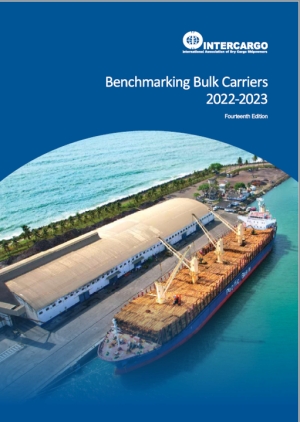


(Posted on 12/06/23)
Despite a steady increase in port state control detention rates following the pandemic in all regions, INTERCARGO-entered vessels consistently outdid industry performance indicators in both deficiencies and detentions, as shown by the latest edition of its annual Benchmarking Report.
The Benchmarking Bulk Carriers 2022-2023 Report provides information on detention rates and deficiencies per inspection (DPI) across Flag States, Class, insurers, and Port State Control, in addition to owners’ benchmarking and a review of the negative performance indicators currently affecting the sector.
Deficiencies per inspection (DPI) rates remain unchanged and in line with previous years’ Benchmarking Reports, the 11 leading Class Societies (IACS Members), which class over 95% of the bulk carrier market, performed significantly better than non-IACS classed vessels in terms of DPI, with an average of 1.69 vs 4.31.
AMSA tops the list of the nine regional PSC authorities and two national PSC regimes with a detention rate of 8.52% for vessels calling at Australian ports vs the average across all authorities of 2.34%, while it also has the worst DPI rate at 3.98 vs the average across all authorities of 1.55.
As expected, the leading Flags outperformed the global fleet with a DPI of 1.63 in 2022 albeit a slight increase compared to last year.
In 2022 the global bulk carrier fleet was registered with 92 Flags, an increase of four compared to 2021 and out of these, 15 have fleets of 100 bulk carriers or more, accounting for just over 89% of the global bulker fleet. Panama, Marshall Islands and Liberia continue to be the three dominant Flags, however, Bangladesh also joined the leading line-up for 2022 with 104 registered vessels.
Commenting on the 2022-23 Report, Paul Markides, Marine Quality Manager at INTERCARGO, says: “As the fourteenth edition of the benchmarking report shows, our members are making great efforts to help us to achieve our ambitious aims and objectives and we commend them for this.
“Detention rates and DPI rates are once again both lower for INTERCARGO members and it is pleasing to see that whilst there has been an overall increase in detention rates in the industry as a whole, the ratio of members’ vessels being detained as part of the total dry bulk fleet fell in 2022.”
AtoB@C Shipping, a subsidiary of ESL Shipping, has announced the successful delivery of Fleximar, the... Read more
Western Bulk, together with reputable Norwegian partners A/S J. Ludwig Mowinckels Rederi, Premium Maritime... Read more
Pacific Basin Shipping Limited, one of the world’s leading dry bulk shipping companies, has announced... Read more
Columbia Group anticipates a period of strong expansion as an increasing number of international shipowners... Read more
Norse?Ship Management has expanded its use of Smart Ship Hub’s high frequency sensor data and... Read more
As the maritime industry gears up to welcome the IMO’s STCW bullying and harassment training amendments... Read more
NORDEN has acquired the cargo activities of Taylor Maritime in Southern Africa (previously operated... Read more
Philippos Ioulianou, Managing Director of EmissionLink, has warned the IMO’s decision to delay... Read more
VIKAND has highlighted the need for cultural change in the maritime sector as reports of bullying, harassment... Read more
The maritime industry is experiencing a period of significant transformation, driven by rapidly evolving... Read more